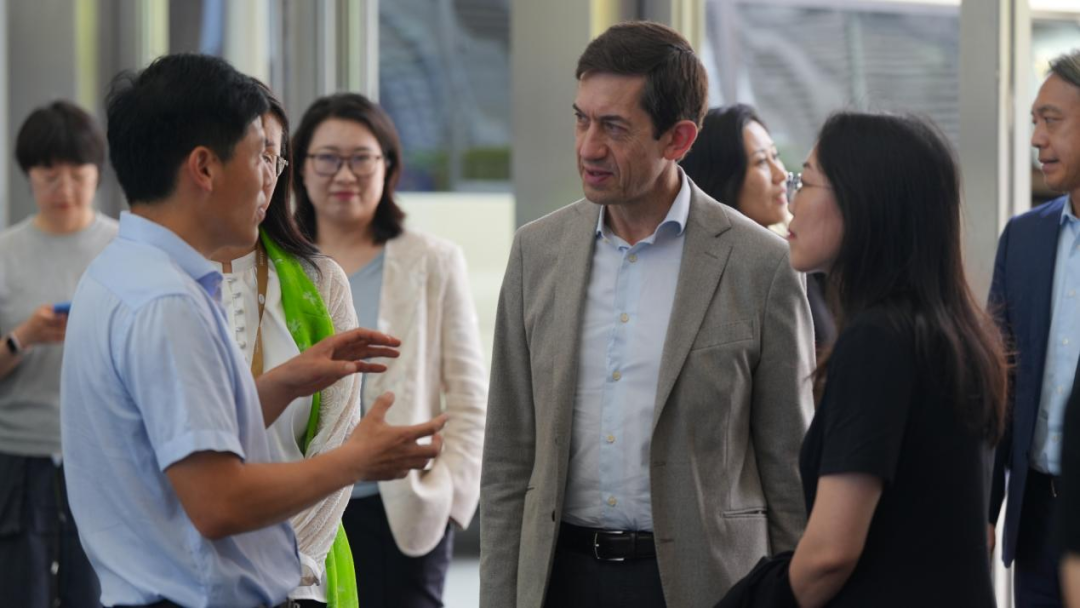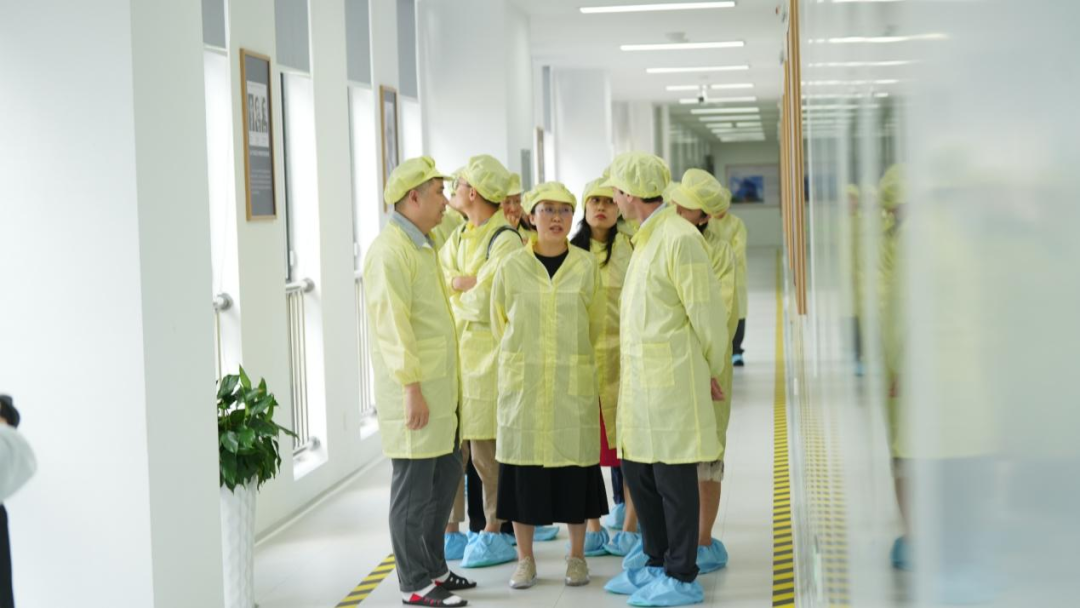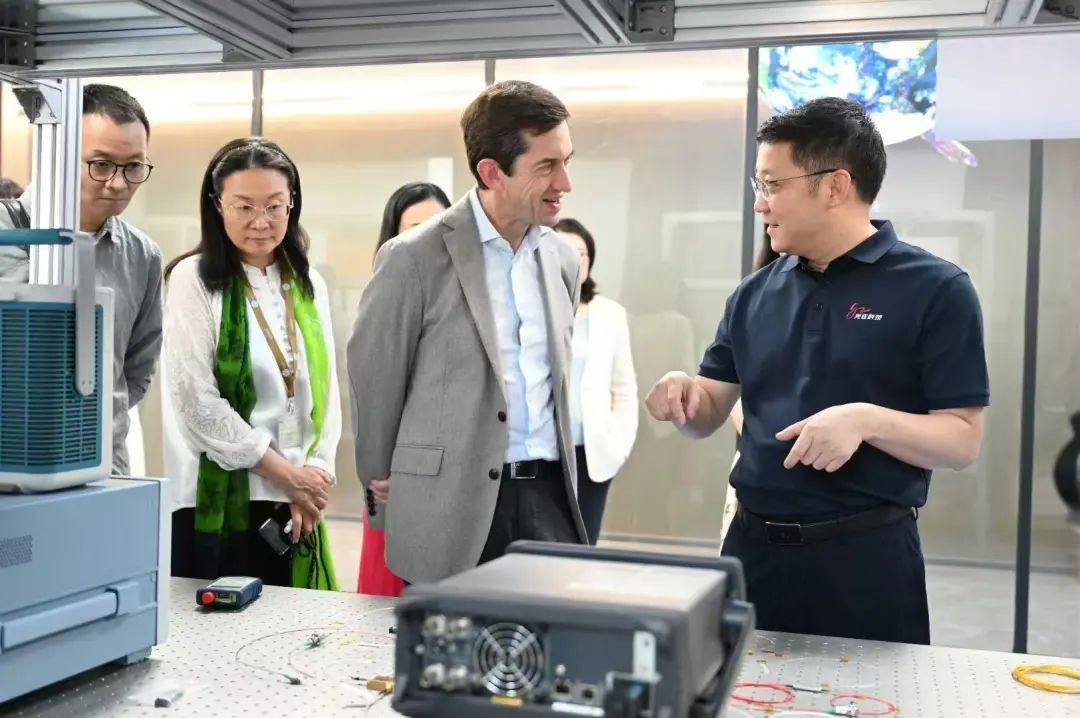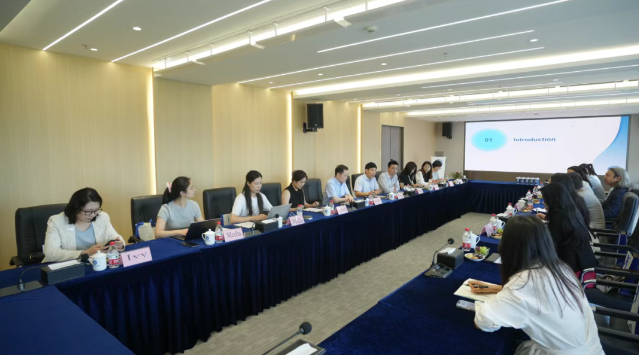
【Member News】Alliance Director Qi Hongji: China's Sci Tech Innovation Collides Head-on with the World
日期:2025-06-04阅读:582
China's science and technology innovation has once again gone viral.
On May 19, Professor Francisco Veloso, the dean of INSEAD, one of the world's top MBA programs, which ranked first in the Financial Times for its executive program customization program in 2024 and has a perfect academic reputation rating, led a team to Fuyang, Hangzhou. Accompanied by Qi Hongji, the director of the Hangzhou Institute of Optics and Fine Mechanics, Professor Francisco Veloso conducted an on-site inspection of the incubation base and discussed the growth model of hard-core technology innovation enterprises with the leaders of typical incubation enterprises such as CACES Technology and Guangzai Technology. We also had in-depth discussions and exchanges with Qi Hongji, the director of the Hangzhou Institute of Optics and Fine Mechanics, Deputy directors Zhuang Chunguang and Zhao Hongxia, and Jiang Shibin, the founder of YINHU Laser, to explore future cooperation and promotion. The two sides reached consensus on academic research in the field of science and technology innovation and entrepreneurship, education services for science and technology entrepreneurs, product and course development, and institutional mutual visits. Thus, a world-class dialogue on hardcore science and technology innovation is launched.

On the afternoon of May 19th, Professor Veloso arrived at the Hangzhou Institute of Optics and Fine Mechanics
Veloso believes that European science and technology innovation needs to keep up with the pace
Before taking up the position of INSEAD dean, Professor Velosso was the dean of the Imperial College Business School, where his research focused on technology innovation and entrepreneurship, and was a member of the advisory body of the European Commission.
In September 2024, the European Commission's report on the competitiveness of the European Union pointed out that Europe must narrow the gap in innovation with China and the United States, particularly in advanced technology.
Against this backdrop, Velosso has said that Europe needs to reflect on why it has not, like the rest of the world, produced some companies that lead in technology and solutions. Europe needs to build a more integrated common market, develop new venture capital and capital investment tools, and find some bolder ways to drive development.
This is also one of the purposes of Velosso's visit to Hangzhou.
Focusing on the Venture Capital Model of Scientists, Which Become the Focus of INSEAD
Hangzhou Institute of Optics and Fine Mechanics is a "hard technology" incubator focusing on the field of optoelectronics. Since its establishment six years ago, the Hangzhou Institute of Optics and Fine Mechanics has incubated over 60 projects, registered more than 50 enterprises, introduced over 2.5 billion yuan of external social capital, and the total valuation of the incubated enterprises has exceeded 25 billion yuan. The enterprises it has incubated have received wide attention in the industry.

Qi Hongji introduced the overview of the Hangzhou Institute of Optics and Fine Mechanics to Professor Veloso
What is the secret to the success of the Hangzhou Institute of Optics and Fine Mechanics? This is the focus of Velosso's attention.
In summary, the success of the SIOM-H can be attributed to two key words: focus and systematization.
The Hangzhou Institute of Optics and Fine Mechanics focuses on the transformation of scientific and technological achievements in the field of optoelectronics and uses systematic incubation to help scientists start their own businesses, thus being "able to understand and assist". Unlike other venture capital institutions, the Hangzhou Institute of Optics and Fine Mechanics has established a technical committee composed of scientific research experts in relevant fields. It screens outstanding scientific research and technical teams in the field based on the technological innovation degree, scarcity, technical barriers, application scenarios, and market growth potential of the field, and encourages scientists to start their own businesses. The philosophy of the Hangzhou Institute of Optics and Fine Mechanics is that the core of technological entrepreneurship lies in scientists. They are the inventors and owners of technology and possess the continuous innovation ability in the field of technology, thus being able to maintain technological competitiveness continuously.
What Should You Do when They Encounter Difficulties in Starting a Business?Answer: We'll Accompany Them to Solve It
To be the science and technology innovation incubator that "understands scientists best" is the mission and original aspiration of the Hangzhou Institute of Optics and Fine Mechanics.
For scientists, Professor Veloso is concerned that innovation and entrepreneurship do not always succeed. So, where is the fallback for scientists within the research system when they venture into entrepreneurship?
Professor Veloso visited CACES Technology Co., LTD., an enterprise incubated by the Hangzhou Institute of Optics and Fine Mechanics. The founder Qu Qiuzhi gave a relevant explanation.
The Hangzhou Institute of Optics and Fine Mechanics is addressing through practice the question of how to minimize the possibility of failure for "scientists" in starting their own businesses. There is a huge gap between "scientists" and "entrepreneurial entrepreneurs". The Hangzhou Institute of Optics and Fine Mechanics needs to act as a systematic bridge for scientific and technological innovation support, bridging the gap between scientific research and the operation of commercial entities. This is what the Hangzhou Institute of Optics and Fine Mechanics summarizes as "algorithms". Including the handling of intellectual property rights of the research institutions to which the research teams belong, the role of the original units, how to build trust between scientists and the introduced executives, and how to help scientists change their thinking, manage the market, build the system, and control the pace.
Building trust is also an important way to solve the problem of scientists' fallback, especially when enterprises are established, relying on the original platform resources may be more beneficial to the development of the enterprise. Therefore, building trust is a mechanism for handling multiple relationships, including intellectual property division, affiliation building, etc. Even the trust model is based on the master-apprentice relationship, such as scientists being responsible for scientific research, His students are responsible for the operation of the enterprise.
Veloso: The Innovation and Entrepreneurship in China can Only be Described as "Amazing"
In the exchange, Veloso said that China has transformed from a technology user to a true innovator in a very short period of time and has made very high progress in the number of patent applications compared globally. For example, in Singapore, Chinese companies have filed more patents than the United States, especially in some major and vertical fields of scientific and technological achievements. It has surpassed the international level or is among the world's best.
Xia Haiyun, representative of the incubation enterprise of Hangzhou Institute of Optics and Fine Mechanics, showcased to Professor Veloso the related products and technologies of Guangzai Technology
At the Hangzhou Institute of Optics and Fine Mechanics, he observed that some of the operation and incubation methods of science and technology innovation enterprises that the United States and Europe were relatively proficient in, with the efforts of Chinese science and technology innovators, were implemented more efficiently. It means that China's global role has shifted from being a learner to an innovator. Today, China's science and technology innovation has entered a new stage of mutual learning with Europe and the United States, which also marks that China's venture capital industry is gradually stepping onto the world stage.
INSEAD Support Chinese Venture Capital Models Go Global
INSEAD, one of the top business management research institutions with four major campuses worldwide, has no more than 10 percent of students of the same nationality in each class. Alumni and students themselves are the connectors of global business, undertaking the communication and exchange of ideas in global business. The incubation system of China's hardcore technology will also become an important resource for global business managers to study.
Professor Veloso held a discussion and exchange with Qi Hongji, the director of the Hangzhou Institute of Optics and Fine Mechanics, Zhuang Chunguang and Zhao Hongxia, the deputy directors, and Jiang Shibin, the founder of YINHU Laser
Through this visit, the two sides reached a series of consensus on jointly serving science and technology entrepreneurs, academic research in the field of science and technology innovation and entrepreneurship, curriculum research on science and technology entrepreneurship education, and institutional mutual visits. Veloso looks forward to further strengthening cross-border cooperation in business administration talent development and incubation models.


